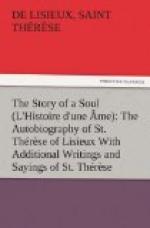* * * * * *
“Advise us,” we said to her, “how to profit by our spiritual instructions.” “Go for guidance with great simplicity, not counting too much on help which may fail you at any moment. You would then have to say with the Spouse in the Canticles: ’The keepers took away my cloak and wounded me; when I had a little passed by them, I found Him whom my soul loveth.’[19] If you ask with humility and with detachment after your Beloved, the keepers will tell you. More often, you will find Jesus only when you have passed by all creatures. Many times have I repeated this verse of the Spiritual Canticle of St. John of the Cross:
’Messengers, I pray, no more Between us send, who know not how To tell me what my spirit longs to know. For they Thy charms who read— For ever telling of a thousand more— Make all my wounds to bleed, While deeper then before Doth an—I know not what!—my spirit grieve With stammerings vague, and of all life bereave.’”
* * * * * *
“If, supposing the impossible, God Himself could not see my good actions, I would not be troubled. I love Him so much I would like to give Him joy without His knowing who gave. When He sees the gift being made, He is, as it were, obliged to make a return. . . . I should wish to spare Him the trouble.”
* * * * * *
“Had I been rich, I could never have seen a poor person hungry without giving him to eat. This is my way also in the spiritual life. There are many souls on the brink of hell, and as my earnings come to hand they are scattered among these sinners. The time has never yet been when I could say: ’Now I am going to work for myself.’”
* * * * * *
“There are people who make the worst of everything. As for me, I do just the contrary. I always see the good side of things, and even if my portion be suffering, without a glimmer of solace, well, I make it my joy.”
* * * * * *
“Whatever has come from God’s Hands has always pleased me, even those things which have seemed to me less good and less beautiful than the gifts made to others.”
* * * * * *
“When staying with my aunt, while I was still a little girl, I was given a certain book to read. In one of the stories great praise was bestowed on a schoolmistress who by her tact escaped from every difficulty without hurting anyone’s feelings. Her method of saying to one person: ‘You are right,’ and to another: ’You are not wrong,’ struck me particularly, and as I read I reflected that I would not have acted in that way because we should always tell the truth. And this I always do, though I grant it is much more difficult. It would be far less trouble for us, when told of a worry, to cast the blame on the absent. Less trouble . . . nevertheless I do just the contrary, and if I am disliked it cannot be helped. Let the novices not come to me if they do not want to learn the truth.”




